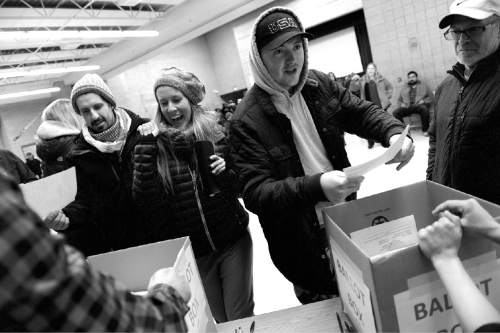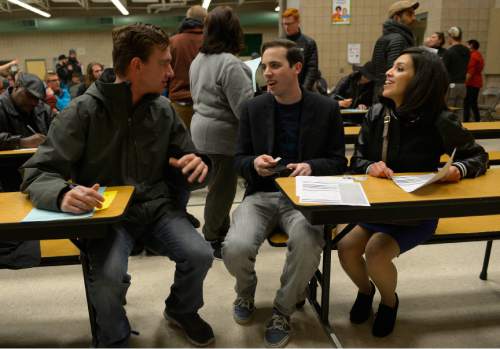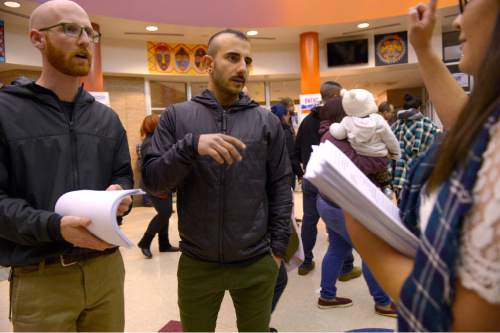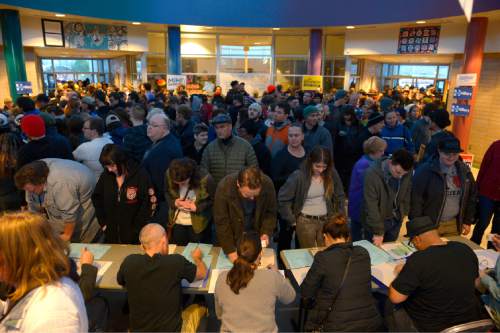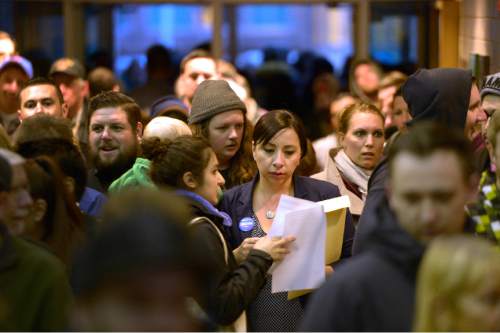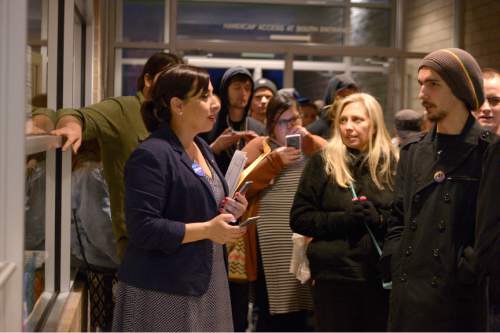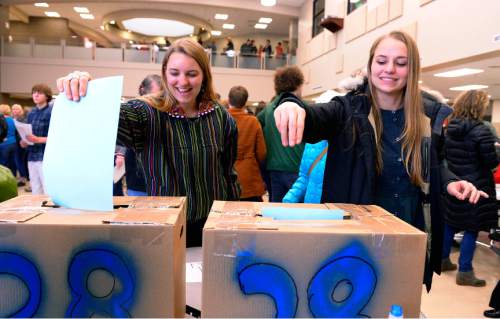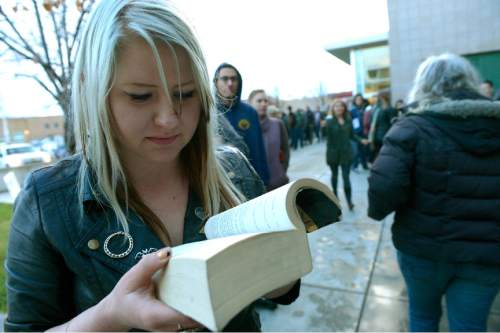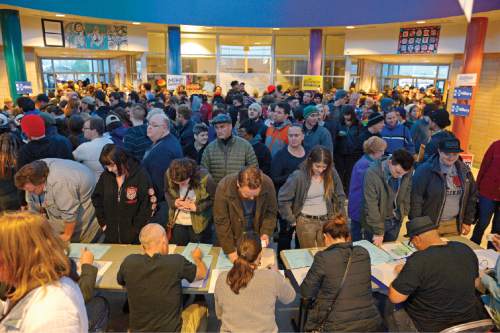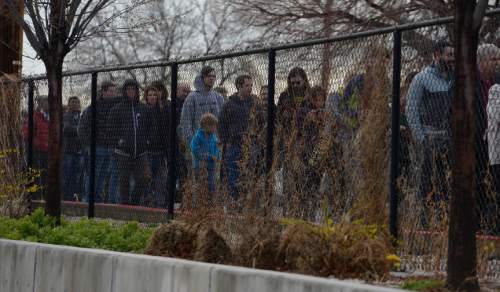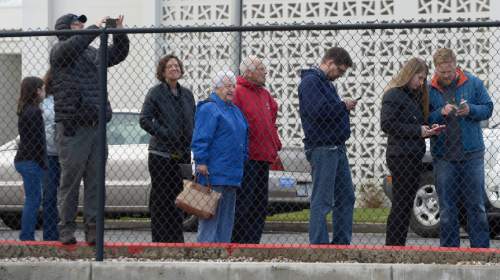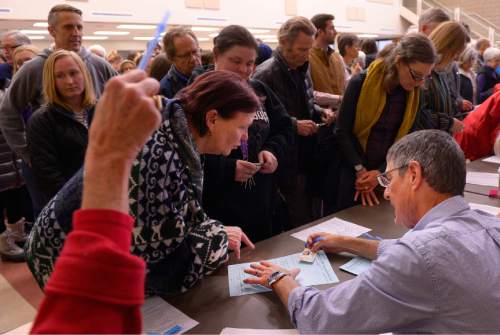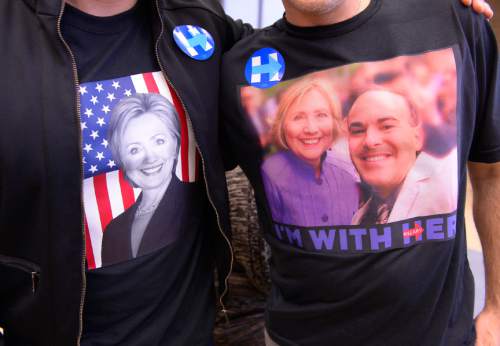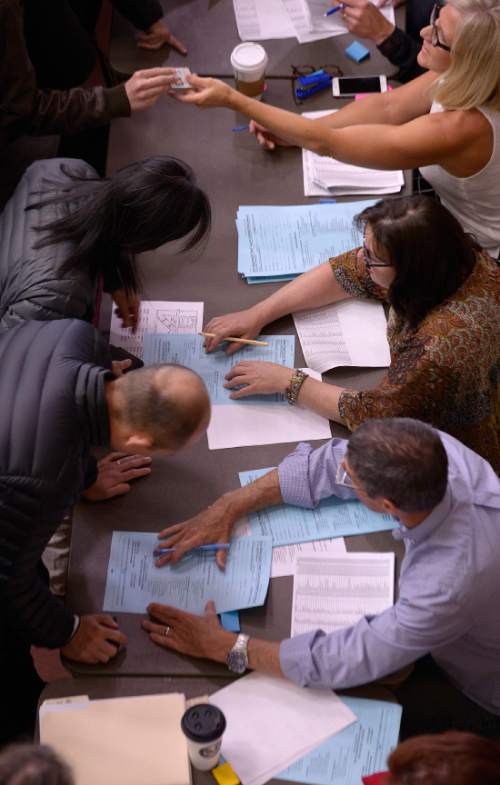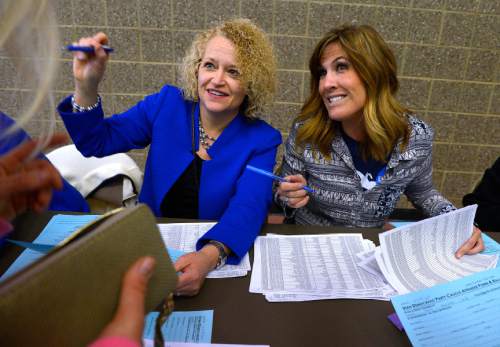This is an archived article that was published on sltrib.com in 2016, and information in the article may be outdated. It is provided only for personal research purposes and may not be reprinted.
A rainy evening didn't dissuade them. Neither did lines that stretched multiple city blocks. Tens of thousands of Utahns were willing to wait hours Tuesday evening to cast their ballot in the state's Democratic caucus, a rare moment when this conservative state's more liberal residents felt empowered.
"This is the first time it matters that I come out to vote in Utah," said Debra Walker, a business analyst who lives on Salt Lake City's east side. "It feels good. It is a voice."
It was an avalanche of a victory for Vermont Sen. Bernie Sanders, who as of Wednesday morning, had claimed 79 percent of the ballots counted to Hillary Clinton's 20 percent. There are a few thousands votes still left to count and that may take until the canvas on April 6. Based on unofficial results, Sanders is expected to claim 27 of the 33 pledged delegates.
Walker said she hadn't heard of Sanders before the campaign, but appreciated his support for progressive programs far more common in Europe than in the United States. She was so taken by Sanders that she waited in another long line last Friday to hear the candidate speak at This Is The Place Heritage Park.
He held another rally at West High School on Monday and spent $300,000 on TV ads, making a big push in Utah, as well as in Idaho and Arizona, which also held contests Tuesday, hoping to regain momentum after losing five primaries last week.
Democratic front-runner Hillary Clinton had a staff in Utah, her daughter, Chelsea, made a campaign stop, and she collected the endorsements of top officials such as Salt Lake City Mayor Jackie Biskupski and Salt Lake County Mayor Ben McAdams. But she didn't compete here to the same degree Sanders did. Clinton didn't visit the state in the days leading up to the caucus vote nor did she buy any campaign advertising.
Many of her supporters didn't expect her to win Utah. It follows the same pattern they have seen throughout the nation.
Before Tuesday, Sanders had won five of the six states that held caucuses, including Colorado on March 1. But he has won only four of the 19 states that held primaries. On Tuesday, Clinton won in Arizona, another primary state.
Chris Karpowitz, a political scientist at Brigham Young University, has studied this trend. He said caucuses, run by political parties, tend to attract fewer people than normal state-run primaries, and those people are "a more ideologically consistent and committed group."
Voters had to be committed Tuesday, when the Democratic turnout overwhelmed state party expectations, leading to caucuses that ran out of ballots, forcing officials to scramble to print more. The state party originally printed 65,000 ballots but by the end of the night predicted that 80,000 people showed up to vote at just 90 locations.
"It highlights why the state should be running elections and not us," said an exasperated Yandary Zavala, the state party spokeswoman.
Democrats wanted the state to run a full primary, but the GOP-led Legislature declined when the Republican Party said it preferred a caucus.
Beyond excitement over the Democratic candidates, some of the turnout was spurred by fear that Donald Trump, the GOP front-runner, could win in November.
"Trump has a lot to do with it. He's got everybody riled up," said Gerald McDonough, 70, who had never seen anything like the four-block line outside of Emerson Elementary in east Salt Lake City.
At gatherings throughout the state, many young voters helped pack the caucuses, some who had never voted before, such as Serah Shirley, 25, who started looking into the Democratic candidates out of revulsion at the Republican choices. She supports Sanders because she believes he's more authentic.
Sammy Washington, 22, stood in the long line at Mountain View Elementary in Salt Lake City's Glendale neighborhood. She said Sanders is inspiring to young people. "He's here to bring people together," she said, pointing to his calls for government-run health care and tuition-free education
Nathan Howell, a 37-year-old who works in software, said he came to the caucus "because this may be the only chance I get to vote for Bernie Sanders."
He was far from alone in expecting Clinton to win the nomination eventually, as she has a 300-delegate lead.
Mark Glick, who caucused at Clayton Middle School, said he was voting for Sanders because he believes the senator would rein in Wall Street, particularly after the role the major banks played in the 2008 recession. But his real hope is that Sanders' strength would force Clinton to adopt some of his positions.
"The better Bernie does," he said, "the more she'll be pushed in that direction."
Clinton had plenty of supporters, including Biskupski, who brought a box of extra pens when she showed up at Clayton and then pitched in as a volunteer passing out ballots.
Biskupski said Clinton is the most experienced candidate in the field, the most likely to work across the aisle with the Republicans and has concrete funding proposals for her plans.
For some voters, that experience was key.
Farris Atwood, 80, backed Clinton because she has served as secretary of state, a senator from New York and as first lady.
"She has the knowledge to do the job," he said. "And I don't think the others do."
The Utah Democratic Party will release the official results early Tuesday.
The state's 33 pledged delegates will be split proportionately.
Utah also has four superdelegates, who are party leaders not bound by the state's caucus vote. Utah Democratic Committeewoman Patrice Arent and Democratic Vice Chairwoman Breanne Miller have already announced their support for Clinton.
State party Chairman Peter Corroon and Wayne Holland, the national committeeman, have yet to announce their decision.
Christopher Smart, Jennifer Dobner and Bob Mims contributed to this report


